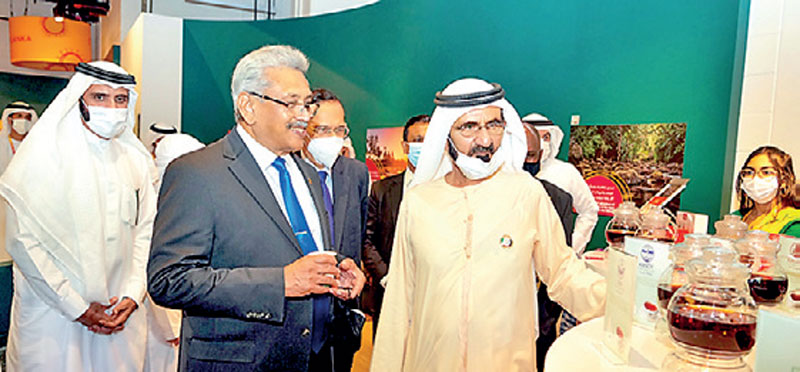Monday Feb 23, 2026
Monday Feb 23, 2026
Monday, 6 December 2021 03:23 - - {{hitsCtrl.values.hits}}

United Arab Emirates Prime Minister, Vice President, Defence Minister and ruler of the Emirate of Dubai Sheikh Mohammed bin Rashid Al Maktoum with President Gotabaya Rajapaksa during their Sri Lanka Pavilion visit at the Expo 2020 in Dubai
|
President Gotabaya Rajapaksa delivers the inaugural address at the 2021 Indian Ocean Conference in Abu Dhabi on Saturday
|
President Gotabaya Rajapaksa on Saturday emphasised the need for everyone in the Indian Ocean region and outside to work together to revive the economy after the devastating impact of COVID-19 pandemic.
The President made these remarks delivering the inaugural address at the Indian Ocean Conference (IOC) held in Abu Dhabi, the capital of the United Arab Emirates (UAE).
He said the measures taken worldwide to combat the pandemic, although they proved invaluable in saving countless lives, came at a steep cost.
The rapid decline in economic activity these measures caused have had serious long-term consequences on global travel, trade, and economic growth, he noted.
The President pointed out that developing countries in particular had been very badly impacted by this and that economic recovery could only be achieved through the support provided by richer nations to developing countries.
The theme of IOC 2021 was ‘Ecology, Economy, Epidemic’ and Foreign Ministers representing 18 countries and over 200 delegates from over 40 countries, including former Prime Minister Ranil Wickremesinghe, attended the conference.
In his speech the President said the COVID-19 pandemic would not end until everyone, everywhere was inoculated against the virus and requested the nations with capabilities, to provide assistance to underprivileged nations to make their vaccination drives productive.
In contrast to the leadership provided by the World Health Organization (WHO) for the global pandemic response, no world institution has stepped forward to help countries navigate their economic recovery, he claimed. Although the pandemic has affected rich and poor countries alike, a disproportionate impact is borne by poorer countries.
The President pointed out that the economies that were already burdened with external debt obligations were facing hardships, and therefore, it would be greatly appreciated if more action could be taken by wealthy nations as well as multilateral organisations to forgive, restructure, or grant moratoria for the debt repayments of poorer countries struggling in the wake of the pandemic.
As the pandemic has shown, adverse situations in one country can quickly have ramifications on the wider region and eventually on the globe itself. That is why the countries across the region and the world at large must work together to solve problems that affect nations, whether in terms of epidemics, economy, or ecology. The President said the ongoing climate crisis was perhaps the most difficult challenge that humanity needed to overcome.
The X-Press Pearl disaster was not an isolated incident. The fire on board the MT New Diamond was successfully doused through concerted efforts. The President pointed out that both these incidents point towards the urgent need for stricter controls surrounding the oceanic transport of hazardous and environmentally sensitive materials.
Extra-territorial fishing by well-equipped trawlers is another significant problem in the region that affects the livelihoods of poor communities that rely on local fishing for their sustenance.
The President said coordinated action to mitigate such issues would be critical in sustaining the overall ecology and the viability of local economies in the Indian Ocean region in the future and he proposed the establishment of a regional mechanism to coordinate such issues relating to sustainability.
While stating that it must be admitted that the Indian Ocean region was also the location of considerable criminal activity, including human smuggling, drugs smuggling, and terrorism, President Rajapaksa said narcotics trafficking remained a significant problem for countries in this region and that this could only effectively be dismantled through coordinated efforts between the intelligence services, coast guards and navies of regional countries.
The President pointed out similar coordination and cooperation would be required to contain human trafficking and said such coordination would also be required to counter the threat posed by religious extremism and terrorism in countries in the region. The President said extremist and terrorist ideology could spread with ease from nation to nation unless carefully monitored and suppressed.
In his Special Address to the forum, Foreign Minister of Oman Sayyid Badr Bin Hamad Bin Hamood Al Busaidi said President Gotabaya Rajapaksa had paved the way for a productive discussion that could act as a platform for effective multilateral action across the Indian Ocean. The Omani Foreign Minister further said that the world needed to take steps today to conserve the extraordinary beauty and biodiversity of the ocean for future generations and, crucially, reverse the damage already done through overfishing and pollution.
External Affairs Minister of India S. Jaishankar said Indian Ocean nations had been called upon today to take greater responsibility, create better relationships and display more initiative. He also said in his Keynote Address that the world needed to expeditiously normalise travel through certification recognition so that the livelihoods affected by the COVID-19 pandemic were restored.
The first Indian Ocean Conference commenced in 2016 with the objective of discussing issues of common interest and concerns to countries in the Indian Ocean region and other countries using the Indian Ocean. The fourth summit was held in the Maldives in 2019 and the theme was ‘Securing the Indian Ocean Region: Traditional and Non-Traditional Challenges’.